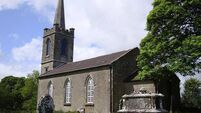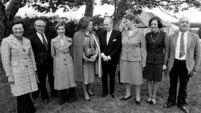Christmas 1942 was celebrated amid the gloom and uncertainty of a world war
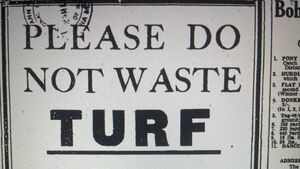
A notice published in the Western People during World War II urging the public not to waste turf.
On December 12, 1942, the front page of the carried an eye-catching notice, set in bold type. The announcement alerted readers to a small, but welcome gesture, in times of great hardship. There would be a doubling of the tea ration - from half an ounce to one ounce per person- for the upcoming Christmas period.
The source of those hard times was of course ‘The Emergency’- the name given to the duration of World War II in Ireland. On September 2, 1939, one day after Hitler’s troops invaded Poland, Taoiseach Éamon de Valera declared a state of Emergency, so-called because of the very real danger of invasion by Germany or Britain.
The extraordinary times called for extraordinary measures. New legislation in the form of The Emergency Powers Act, “to make provisions for security public safety and preservation of the state in time of war”, was swiftly passed. A fledgling sovereign nation with limited defence forces, Ireland would remain neutral in the conflict. This stance was held steadfastly by de Valera, even when British Prime Minister Winston Churchill employed a variety of tactics to persuade him otherwise.
The war created a problem with much more practical implications for ordinary citizens in their everyday lives. Ireland relied heavily on Britain for a plethora of essential goods and commodities; everything from sugar, tea, flour, soap and clothing to batteries, tyres, electric bulbs, fertiliser and building supplies was brought in from our nearest neighbours. When imports were severely curtailed, the impact on households, farms and businesses was immense.
A new Department of Supplies was brought into being. de Valera appointed future Taoiseach Séan Lemass as Minister for Supplies, tasking him with the unenviable job of managing the country's limited resources. Farmers were faced with compulsory tillage orders to increase native wheat supplies. The electricity supply was restricted. To preserve petrol, private motoring was banned except for essential personnel such as doctors. When coal imports dried up, the state asked the people of Ireland to dig deep- quite literally- and fulfill their ‘national obligation’ by cutting turf to heat their homes.
Christmas 1942 - 80 years ago this year - was the fourth consecutive festive period tainted by the gloom and uncertainty of the Emergency. A look through the local newspapers of the day brings into sharp focus the many challenges faced by the community of Ballina and its surrounds.
Food - or rather the lack of it - was a great source of concern, not just at Christmas, but all year round. Ration books had been issued to every household. The number of coupons in each, redeemable in local stores, was determined by the number of people in each family. Goods sold for cash were subject to ‘controlled pricing’, and shopkeepers who bent the rules could be penalised. Ballina District Court saw a steady stream of cases involving local merchants who were found to be guilty of overcharging their customers for goods such as cigarettes, candles, and cocoa. There was, of course, a lucrative black market in operation nationwide, for those who had the means to pay over the odds for items they desired.
The ongoing scarcity of butter in the area came up for discussion at the Ballina Parish Council in early December 1942. The board resolved to “urge the housewives to make such economics …to meet the situation” and recommended that the quantity of butter served at meals of ‘bread and spread’ in the homes of Ballina be reduced by one-third. The accompanying bread was, of course, ‘black bread’, made from a dark course flour. So rare was the variety made with fine white flour that it became known as ‘fancy bread’.
There was better news on the bacon front, with the Pigs and Bacon Commission confirming a relatively ample supply for Christmas ’42. While the traditional Christmas Ham was a “rarity” and “gammons not very plentiful”, customers were assured that ‘bacon in chunks of three or four pounds” would be available, reported the in mid-December.
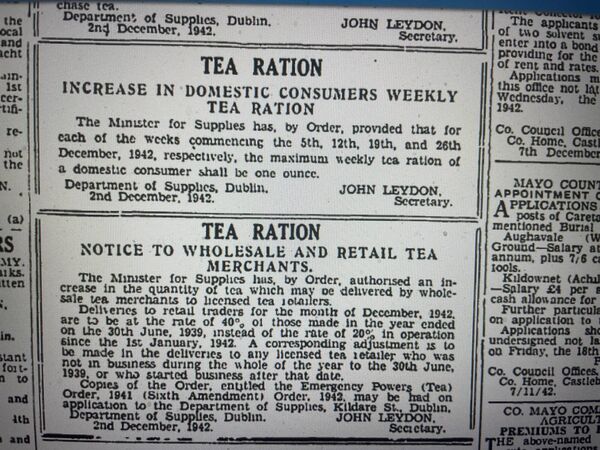
While goose remained the preferred seasonal main dish of choice for most Irish people right up until the 1950s, rabbits, ducks, and hens were sold in large quantities at Ballina’s weekly market and in butchers such as Curry’s of King Street.
Turkey chicks could be bought quite cheaply in summer and reared in time for Christmas - a common practice among thrifty Ballina homemakers with foresight, and a small back garden of course. In December 1942, the local newspapers highlighted numerous cases of night-time thefts of turkeys around the town. One serial offender boldly targeted Ardnaree, Clare Street and Howley Street on three consecutive nights in early December before he was apprehended with his substantial feathered loot. Local Gardai in Ballina, under the command of Superintendent Kilroy, were part of a cross-county sting operation that led to the interception of a lorry load of stolen fowl on the McHale Road in Castlebar.
The banks of the Moy were patrolled regularly for would-be night-time poachers of the river’s world-famous salmon. There were dramatic scenes on the outskirts of Crossmolina when a gang of six poachers with blackened faces brawled with local law enforcement.
The shortage of dried fruit made traditional Christmas cake-making quite a challenge. The printed a recipe, which would not look out of place in a modern-day vegan cookbook, calling for the substitution of fruit with a generous amount of finely grated carrot. For the Christmas pudding, soaked prunes would have to do. There was no custard powder to mask the taste either, as the stock was found to be unfit for consumption and recalled from retailers.
Luckily, potatoes – described in the press as “the second line of defence against the war” - were in decent supply in winter ’42. The town’s water supply was in good working order, in contrast to the previous Christmas when “large quantities of eels in the water” meant that supply was cut off at short notice.
There were no oranges - the staple of many a child’s Christmas stocking - to be had and festive boxes of sweets and chocolates were no longer displayed in local shop windows. All-night lighting of the town was permitted for just three nights over the festive season - Christmas Eve, Christmas night and New Year's Eve.
When private motor cars were put off the road, horse-drawn vehicles of every description were a familiar sight around the town. With batteries and lamps hard to get hold of, the practice of lighting the way after dark with a candle stuck into a bottle was commonplace, yet could result in a court appearance and a fine. The status of the humble bicycle - the primary mode of transport for most people - was greatly elevated. Public transport timetables were cut back substantially and when turf replaced coal as fuel to run trains, journeys by rail were not advised for anyone in a hurry!
Wooden toys, rag dolls, picture books and comics were brought by Santa Claus, who was unfortunately given no special dispensation. Tickets for the Irish Hospital Sweepstakes - the forerunner to the National Lottery - were sold widely. Christmas cards and little festive postcards, sold for a penny in shops such as Duncan’s on Pearse Street were popular with all ages. The exchanging of written season’s greetings with friends and neighbours was one of the few remaining customs uninterrupted by war.
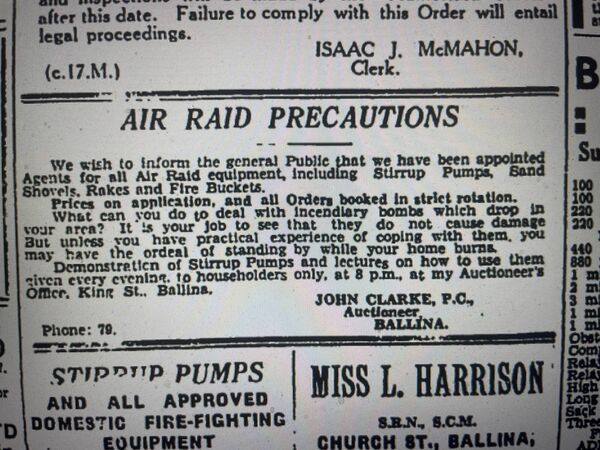
Ballina Post Office was a bustling hive of activity in the lead-up to Christmas. It’s end-of-year report, a summary of which was published in the , showed an increase in the number of parcels, letters and telegrams sent and delivered. Postmen - on foot or bicycle - delivered over 120,000 letters in the closing weeks of the year.
A sum of over £5,000 worth of ‘emigrants remittances’ had been sent home from England via Ballina Post Office in December alone. For many a family, the money was quite simply a lifeline. The letters must surely have been tinged with lonesomeness for the loved one who had swapped the ration book for the ferry ticket in search of work across the water.
For many in our town, hard times had long since been a way a life - war, or no war. Dr McCarthy told Ballina Urban Council of the rising number of cases of local children suffering from acute bronchitis, many of whom were attending school barefoot in bitterly cold weather.
A Free Milk Scheme and Food Voucher Scheme, overseen by the Ballina Urban Council, went some small way towards keeping the wolf from the door for many local families An appeal published in the by the local branch of St Vincent de Paul made for pitiful reading. Readers were asked to “lend a hand to help a poor down and out brother”. The article recounted a story of a local mother who had to resort to burning old boots as fuel to cook food. Subscriptions to the annual collection had dwindled during the war years, yet the need for donations was greater than ever.
Going to dances or to the latest pictures remained the main form of entertainment – although the use of commercial electricity supply was subject the restrictions. Madame Bourke and her Band were the main attraction at the Ballina Town Hall Christmas Dance. Meanwhile, Rita Hayworth and Tyrone Power in lit up the silver screen at the Estoria, transporting cinemagoers to the bullfighting arenas of Mexico City.
In mid-November 1942, the Local Defence Force (LDF) hosted a week-long programme of events for ‘Step-Together Week’ which created a welcome distraction for the people of Ballina. Proceedings got underway on Sunday 15th with a Grand Parade, led by Army Band No 4, through the town centre. A platform was erected outside Thomas Archers’ hardware store on Knox Street, where the troops were reviewed by Minister for Defence, Oscar Traynor.
Events held during the week included a variety concert, a grand dance and céilí, and a challenge march between Ballina Stephenites and the 1st Battalion Army Team (the home team came out on top).
There was a great turnout for the Children’s Fancy Dress Dance in the Town Hall, where music was provided by the Army Novelty Band. The costumes of choice very much reflected the themes of the day, with a great showing of miniature Red Cross nurse and LDF uniforms. The top prize for originality on the day went to Ms. May Gaughan of King Street, who came dressed as a knitting bag!
The days of the ‘Emergency’ are long behind us, yet eight decades later, there are parallels to modern times to be drawn; a war in Europe, rising living costs and energy concerns. The emergency of our time is of course climate change, and we will all be called upon to play our own small part.
Perhaps it is time for us all to take earnestly to heart an adage of bygone days - ‘Waste not, want not'.
Footnote: It is worth noting that Minister for Supplies and future Taoiseach Seán Lemass had a personal connection to Ballina. His sister, Dr Alice Lemass, married William Boland in 1928. William was the son of Bonniconlon-born Christopher Boland, a partner in Ballina’s Riley’s and Boland building providers on Barrack Hill.

